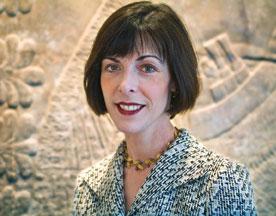 To Elizabeth “Lizzie” Barker, the new director of the Mead Art Museum at Amherst, nothing compares to seeing a piece of art unframed. |
By Emily Gold Boutilier
As an assistant curator at the Metropolitan Museum of Art in New York City, Elizabeth “Lizzie” Barker put together the country’s first major exhibition of paintings, drawings and prints by the British Romantic artist and poet William Blake. The retrospective became a sleeper hit of the museum’s 2001 spring season.
In July, Barker, an expert on the British Enlightenment painter Joseph Wright of Derby, and author of publications on topics ranging from Italian Renaissance drawings to modern American prints, became the new director of the Mead Art Museum at Amherst.
Barker began her career at the Met in 1994 as a curatorial intern, rising to associate curator of drawings and prints a mere 10 years later. In 2005, though, she left the Met—where she had job security in one of the most highly regarded institutions in the world—to become director of the Picker Art Gallery at Colgate University.
Barker made the switch because she believes that college and university museums offer an opportunity for “continual experimentation” that is not available at places like the Met.
Barker received a Ph.D. in art history and a certificate in curatorial studies from New York University’s Institute of Fine Arts. At Colgate, she turned a pre-existing program for student workers into an intensive internship, brought major new acquisitions to the collection and oversaw the creation of audio podcast tours.
Barker envisions the Mead as a public forum—a place for scholars, students and community members to gather to test ideas. She plans to work closely with students and faculty members across disciplines. Among her goals, she hopes to make it easier for museum visitors to view, upon request, any work in the permanent collection, most of which is stashed away in basement-level storerooms. To Barker, nothing compares to seeing a piece of art in the raw like that, without a frame, pedestal or interpretive label; she wants the experience to be readily available to all.